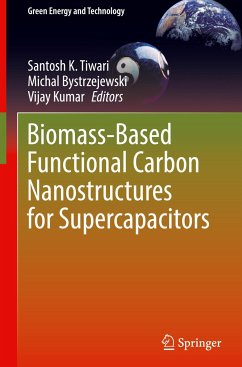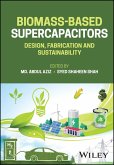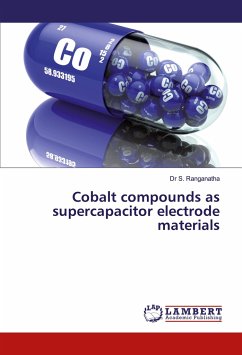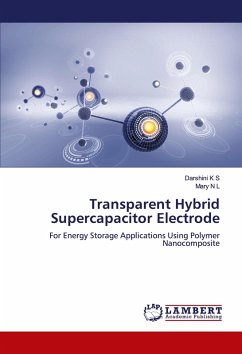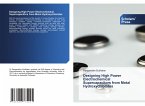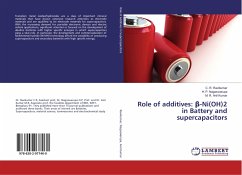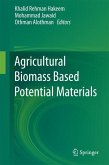Biomass-Based Functional Carbon Nanostructures for Supercapacitors
Herausgegeben:Tiwari, Santosh K.; Bystrzejewski, Michal; Kumar, Vijay
Biomass-Based Functional Carbon Nanostructures for Supercapacitors
Herausgegeben:Tiwari, Santosh K.; Bystrzejewski, Michal; Kumar, Vijay
- Gebundenes Buch
- Merkliste
- Auf die Merkliste
- Bewerten Bewerten
- Teilen
- Produkt teilen
- Produkterinnerung
- Produkterinnerung
This book presents a widespread description of the synthesis and characterization of biomass-based carbon nanostructures. It also covers the vital applications of these materials in supercapacitors and for next-generation energy storage devices. It describes the common design procedures, advantages and disadvantages of biomass-based carbon nanostructures and offers novel visions into the forthcoming directions. In addition, this book will provide new updates about the effect of doping and structural twist on the electrochemical performance of electrode materials derived from biomass sources.…mehr
Andere Kunden interessierten sich auch für
![Biomass-Based Supercapacitors Biomass-Based Supercapacitors]() Biomass-Based Supercapacitors257,99 €
Biomass-Based Supercapacitors257,99 €![Cobalt compounds as supercapacitor electrode materials Cobalt compounds as supercapacitor electrode materials]() S. RanganathaCobalt compounds as supercapacitor electrode materials26,99 €
S. RanganathaCobalt compounds as supercapacitor electrode materials26,99 €![Transparent Hybrid Supercapacitor Electrode Transparent Hybrid Supercapacitor Electrode]() Darshini K STransparent Hybrid Supercapacitor Electrode29,99 €
Darshini K STransparent Hybrid Supercapacitor Electrode29,99 €![Designing High Power Electrochemical Supercapacitors from Metal Hydroxychlorides Designing High Power Electrochemical Supercapacitors from Metal Hydroxychlorides]() Ranganatha SudhakarDesigning High Power Electrochemical Supercapacitors from Metal Hydroxychlorides33,99 €
Ranganatha SudhakarDesigning High Power Electrochemical Supercapacitors from Metal Hydroxychlorides33,99 €![Agricultural Biomass Based Potential Materials Agricultural Biomass Based Potential Materials]() Agricultural Biomass Based Potential Materials112,99 €
Agricultural Biomass Based Potential Materials112,99 €![Role of additives: ¿-Ni(OH)2 in Battery and supercapacitors Role of additives: ¿-Ni(OH)2 in Battery and supercapacitors]() C. R. RavikumarRole of additives: ¿-Ni(OH)2 in Battery and supercapacitors33,99 €
C. R. RavikumarRole of additives: ¿-Ni(OH)2 in Battery and supercapacitors33,99 €![Agricultural Biomass Based Potential Materials Agricultural Biomass Based Potential Materials]() Agricultural Biomass Based Potential Materials112,99 €
Agricultural Biomass Based Potential Materials112,99 €-
-
-
This book presents a widespread description of the synthesis and characterization of biomass-based carbon nanostructures. It also covers the vital applications of these materials in supercapacitors and for next-generation energy storage devices. It describes the common design procedures, advantages and disadvantages of biomass-based carbon nanostructures and offers novel visions into the forthcoming directions. In addition, this book will provide new updates about the effect of doping and structural twist on the electrochemical performance of electrode materials derived from biomass sources. The book will be useful for beginners, researchers, and professionals working in the area of carbon nanomaterials and their applications in energy storage devices.
Produktdetails
- Produktdetails
- Green Energy and Technology
- Verlag: Springer / Springer Nature Singapore / Springer, Berlin
- Artikelnr. des Verlages: 978-981-99-0995-7
- 2023
- Seitenzahl: 380
- Erscheinungstermin: 28. April 2023
- Englisch
- Abmessung: 241mm x 160mm x 26mm
- Gewicht: 735g
- ISBN-13: 9789819909957
- ISBN-10: 9819909953
- Artikelnr.: 67399491
- Herstellerkennzeichnung Die Herstellerinformationen sind derzeit nicht verfügbar.
- Green Energy and Technology
- Verlag: Springer / Springer Nature Singapore / Springer, Berlin
- Artikelnr. des Verlages: 978-981-99-0995-7
- 2023
- Seitenzahl: 380
- Erscheinungstermin: 28. April 2023
- Englisch
- Abmessung: 241mm x 160mm x 26mm
- Gewicht: 735g
- ISBN-13: 9789819909957
- ISBN-10: 9819909953
- Artikelnr.: 67399491
- Herstellerkennzeichnung Die Herstellerinformationen sind derzeit nicht verfügbar.
Dr. Santosh K. Tiwari received his Ph.D. from IIT Dhanbad, India, in Graphene-based Polymer nanocomposites and then worked with HSCL, Hanyang University, Seoul, South Korea, for 1.5 years. In 2019 he joined the University of Guangxi, Nanning, China, as a research faculty and then moved to Poland where he got a prestigious NAWA research grant from Government of Poland and presently working as a scientist in the Department of Chemistry, University of Warsaw. He has published more than 55 research articles in reputed scientific journals and presented his works as an invited speaker in different countries. He has more than 1100 citations with an h-index of 18. To date, he has edited four books on graphene-based nanomaterials for Springer Nature. Dr. Tiwari got several awards and qualified for the top national exams organized in India for research and admission in PhDs including IIT Dhanbad Ph.D. entrance, NET, UGC/CSIR-JRF, and GATE organized by HRD. Prof. Michä Bystrzejewski is a full professor in the Department of Chemistry, Warsaw University, Poland, and has a deep research interest in synthesis and characterizations of carbon nanomaterials, carbon capsules, magnetic nanoparticles, and separation based adsorption. He received his M.Sc and Ph.D. from the University of Warsaw, Poland, and postdoctoral training from Germany as a Marie Curie Fellow. He published more than 150 research articles related to nanomaterials and carbon nanostructures. He finished several research projects granted by the European Union and the government of Poland. Dr. Vijay Kumar is presently working as Assistant Professor, Department of Physics, National Institute of Technology Srinagar (J&K), India. He received his Ph.D. in Physics at the beginning of 2013 from the SLIET Longowal. From 2013 to 2015, he was a postdoctoral research fellow in the Phosphor Research Group, Department of Physics, University of the Free State, South Africa. He has received the Young Scientist Award under the fast track scheme of the Department of Science and Technology (Ministry of Science and Technology, Government of India), New Delhi. He also worked in Grant-in-aid for the joint Center project titled "Joint Center for generating tissue-engineered organs and controlling cell behavior" under Indo-US Joint R&D Networked Center. He has been a nominated member of the Scientific Advisory Committee for the Initiative for Research and Innovation in Science (IRIS) by DST. He has also received the "Teacher with Best Research Contribution Award" by Hon'ble Chancellor, Chandigarh University on Teachers Day. He has more than 75 research papers in international peer-reviewed journals, 10 peer-reviewed conference proceedings, 15 book chapters, and edited 7 books (authored and co-authored). He has more than 3420 citations with an h-index of 33 & an i10-index of 67. He has edited the Virtual Special Issue of Vacuum - Journal - Elsevier and Materials Today: Proceedings and currently editing a special issue "Nano Biocomposites for Future Bioeconomy" of Crystals. He has organized various short-term courses and conferences/workshops. He is a section Topic Editors for 'Polymeric Materials' Materials MDPI Journal. He has delivered invited talks, session chairs and presented his work at various National and International Conferences. His research experience, as well as research interests, lies in synthesis, processing, and characterization of functional materials, solid-state luminescent materials, bio-based/biodegradable polymers, and composite, drug delivery devices, wastewater treatment, polymer nanocomposites, and ion solid interaction.
Biomass-Based Functional Carbon Nanostructures for Supercapacitors.- Methods for Production of Functional Carbon Nanostructures from Biomass.- Key Limitations of Biomass-derived Carbon Nanostructures for Energy Application.- Carbon Nanostructures with the Ultra-high Surface Area and Porosity Derived from Biomass.- Biomass-derived N and S Doped Carbon Nano-shapers for Supercapacitor Applications: Effect of Doping on Energy Density.- Carbon Nanotubes and Similar Nanostructures Derived from Biomass for Supercapacitors Application.- Amorphous Carbon with a Graphitic Pattern Derived from Biomass for Supercapacitor Applications.- Graphene and Graphene-like Materials Derived from Biomass for Supercapacitor Applications.- Metal Doped Nanostructures Derived from Biomass for Supercapacitor Applications: Effect of Doping on Cyclability.- Porous Hollow Biomass-based Carbon Nanostructures for High-Performance Supercapacitors.- Carbon Nanomaterials from Biomass for Solar Energy Conversion and Storage.- Recent Development in the Production and Utilization of Plant Biomass-based Nanomaterials.
Biomass-Based Functional Carbon Nanostructures for Supercapacitors.- Methods for Production of Functional Carbon Nanostructures from Biomass.- Key Limitations of Biomass-derived Carbon Nanostructures for Energy Application.- Carbon Nanostructures with the Ultra-high Surface Area and Porosity Derived from Biomass.- Biomass-derived N and S Doped Carbon Nano-shapers for Supercapacitor Applications: Effect of Doping on Energy Density.- Carbon Nanotubes and Similar Nanostructures Derived from Biomass for Supercapacitors Application.- Amorphous Carbon with a Graphitic Pattern Derived from Biomass for Supercapacitor Applications.- Graphene and Graphene-like Materials Derived from Biomass for Supercapacitor Applications.- Metal Doped Nanostructures Derived from Biomass for Supercapacitor Applications: Effect of Doping on Cyclability.- Porous Hollow Biomass-based Carbon Nanostructures for High-Performance Supercapacitors.- Carbon Nanomaterials from Biomass for Solar Energy Conversion and Storage.- Recent Development in the Production and Utilization of Plant Biomass-based Nanomaterials.

